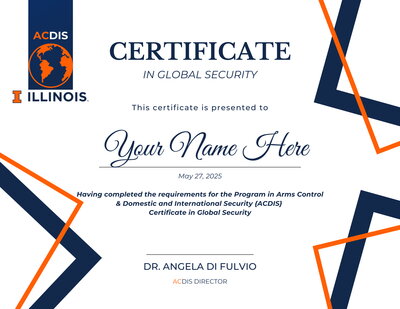To apply please fill out this form: Certificate Information
Please contact ACDIS with any questions: acdis@illinois.edu
The Program in Arms Control & Domestic and International Security (ACDIS) at the University of Illinois is pleased to offer a Certificate in Global Security for undergraduate students. Students who complete the certificate will be prepared to use their knowledge and skills in government, the private sector, NGOs, academia. Also in fields such as international relations, diplomacy, politics, business, law, health, finance, and media. We have ACDIS Certificate alumni all over the world!
The purpose of the certificate is to:
- Provide students with a coherent framework for developing foundational knowledge within the multi-disciplinary field of global security studies
- Complement studies by students in their existing major(s)
- Inform students about opportunities for internships and professional careers in the private and public sectors concerned with national and global security

Credential
This certificate will provide students with an important credential to present to prospective employers. Although current university rules preclude citation of the Certificate of Global Security on their official transcripts; students can add this credential to their CV's. ACDIS will provide a printed document certifying completion of the certificate requirements once students graduate from the University of Illinois.
Certificate Completion Requirements
- 15 credit hours in courses in global security from the approved 'Certificate Course List'.
- GLBL/NPRE 483 Seminar in Security (1 credit) as the required core class for the certificate.
- May count as either a social science/humanities course or a natural/science/engineering/technology course.
- Breakdown of the 15 credits:
- 6 credits must come from social science/humanities courses
- 6 credits must come from natural science/engineering/technology courses.
- The remaining credits may come from any course or courses on the approved ACDIS Certificate Course List
- All courses to be applied to the Certificate must be taken for full credit; they cannot be taken pass/fail or audited. Certificate courses may also be applied to majors.
Completion and Graduation
Students will provide the following to ACDIS:
- An official transcript from the Office of the Registrar, either paper or digital.
- A current mailing address for certificate recipient.
Students have 90 days after the final transcript is available to submit it to ACDIS at acdis@illinois.edu
Students must meet with the ACDIS Director, or an advisor identified by the ACDIS office, to verify completion of the certificate.
Register for the Certificate in Global Security
Students must be in good standing and currently enrolled at the University of Illinois in order to register for the program. Students must meet with the ACDIS Director or Associate Director for an advising appointment to apply. Applications must be made prior to the completion of the required coursework.
Please contact ACDIS to schedule an appointment: acdis@illinois.edu
Also check out our For Students section to find more information on internships, programs, graduate student policies, and student publications.
A full course listing of classes that meet criteria for the Certificate in Global Security, are in the images below.